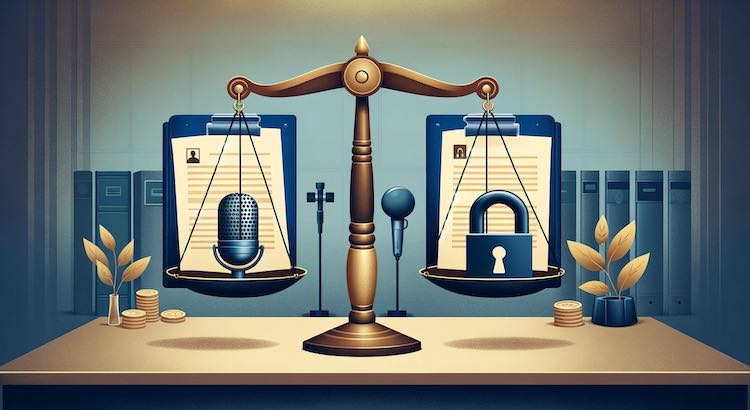The Rise of Automated Transcription: A Legal Perspective
Automated transcription has become a trusted tool for businesses, legal professionals, and individuals. With growing demand for quick, cost-effective text from audio or video files, more people are choosing automated transcription solutions. Yet, using these services involves legal factors that every user should understand, especially when it comes to privacy and data protection.
What Is Automated Transcription?
Automated transcription relies on AI-driven speech recognition to turn spoken words into text. These systems can process large amounts of data quickly, saving time when compared to manual transcribers. However, because they handle sensitive information, particularly in legal settings, robust legal standards must be met.
- Employed by lawyers, courts, and businesses
- Transforms audio files into searchable, editable digital text
- Reduces turnaround time by automating the entire process
A study by Grand View Research found that the global transcription market size was valued at $19.8 billion in 2022 and will expand at a compound annual growth rate (CAGR) of 6.3% from 2023 to 2030 (Grand View Research, 2023).
Privacy Issues in Automated Transcription
Privacy is a major concern in the transcription industry. Many audio files contain personal or confidential information. Mishandling these files could result in severe privacy violations.
Data Protection Laws
- The General Data Protection Regulation (GDPR) regulates data in Europe.
- The California Consumer Privacy Act (CCPA) covers similar ground in the United States.
- Both laws require service providers to keep personal and sensitive data secure and to notify users about how their data is handled.
Consent Requirements
- Recording and transcribing conversations may require the consent of all involved parties.
- In some states and countries, recording without clear consent can lead to legal action.
- Legal professionals should double-check client agreements about recording and transcription.
Organizations should always make sure they have the right type of consent before uploading files to an AI transcription subscription platform.
How Data Security Affects Legal Compliance
Protecting data in transit and at rest is not just good practice—it's required by law in many places. Data leaks in the legal profession can result in lawsuits, regulatory fines, and loss of client trust.
Best Security Practices
- Encryption: All files must be encrypted during transfer and while stored on servers.
- Access Controls: Only authorized people should access transcriptions. Systems should log and control all access events.
- Certification: Top providers pursue certifications such as ISO 27001, which demonstrates a high security standard for information management.
Consequences of Lax Security
- Data breaches expose sensitive case details, risking both client privacy and professional reputations.
- In 2023, the Verizon Data Breach Investigations Report noted a 13% rise in ransomware attacks, many involving legal and healthcare data.
Ethical and Legal Risks in Automated Transcription
Accuracy is critical in legal matters. An error or misinterpreted phrase can change the outcome of a case or cause misunderstandings among business partners.
The Limits of Automated Transcription
- Automated services usually achieve accuracy rates of 85%-95%, depending on audio quality and dialect (Statista, 2023).
- Accents, technical language, and background sounds lower accuracy.
For the best results, manual review or transcription proofreading services can ensure your text is accurate and reliable.
Who Is Responsible for Errors?
- Legal documents built on faulty transcripts create liability for both the service provider and the client.
- Review the terms of service to see what happens if a mistake impacts your case or agreement.
Navigating Legal Requirements for Automated Transcription
Taking a proactive stance keeps your data safe and your business or legal practice compliant. Here are effective steps to follow:
- Know Local Laws: Research whether local, state, or national rules apply to audio and transcription data.
- Secure Agreements: Ensure your contracts with transcription providers spell out responsibilities, liabilities, and data handling practices.
- Do Your Research: Pick transcription providers known for security, privacy, compliance, and accurate results.
If you need to keep files fully confidential, consider human transcription services that offer higher accuracy and manual quality checks.
Getting the Most from Automated Transcription
Automation is transforming the legal and business worlds. Professionals now access accurate, cost-effective text versions of meetings, hearings, interviews, and depositions in hours rather than days.
- Use closed caption services to make legal or business videos accessible and compliant.
- Order accurate subtitling services for multilingual needs.
- Translate your transcripts with a text translation service or audio translation service for global reach.
- Find affordable transcription pricing and captioning services pricing before you order.
When speed, accuracy, and privacy matter, you can always order transcription or order captions directly online with a reputable provider that meets your needs and legal requirements.
Conclusion: Choose Smart, Secure Solutions with GoTranscript
As automated transcription services become more widespread, being aware of the legal and ethical requirements is more important than ever. Secure data management, clear consent, and reliable accuracy are essential—especially in legal and business settings.
GoTranscript offers automated transcription solutions designed for strict privacy, robust data security, and high-quality results. With options ranging from human review to AI-powered automation, GoTranscript helps clients navigate compliance while gaining the benefits of fast, affordable transcription.


 Transcription
Transcription
 Captions (FCC/SDH)
Captions (FCC/SDH)
 Transcript Editing & Proofreading
Transcript Editing & Proofreading
 Translation (text/audio/images)
Translation (text/audio/images)
 Subtitles
Subtitles
 Video Description (AD)
Video Description (AD)









